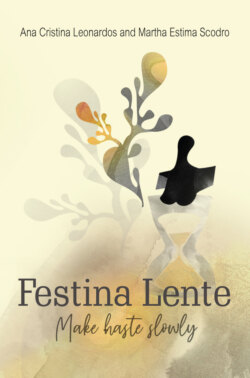Читать книгу Festina Lente - Ana Cristina Leonardos - Страница 10
На сайте Литреса книга снята с продажи.
Festina lente, make haste slowly...
Оглавление“Make haste slowly” is an oxymoron attributed to the Roman Emperor Augustus, represented by a dolphin entwined with an anchor. Agility and dexterity together with security and stability.
This image is useful to us for introducing the theme of the female midlife in the 21st century. At a stage of life when many cycles have been completed and others are calling, the woman at fifty is both the anchor and the dolphin. And she moves within the complementarity of these two images and their respective stages.
In Six Memos for the Next Millennium, writer Italo Calvino tells us a Chinese story to illustrate the subjectivity and relativity of these two stages.
Among the multiple virtues of Chuang Tzu was the ability to draw. The King asked him to draw a crab. Chuang Tzu said that in order to draw it he would need 5 years and a house with 12 servants. After 5 years had passed he had not even started the drawing. “I need another five years”, said Chuang Tzu. The King agreed. When the tenth year ended, Chuang Tzu took the brush and, in an instant, with one single stroke, drew a crab, the most perfect crab that anyone had ever seen.
Psychoanalyst Maria Rita Kehl returns to the fable in Time and the Dog, and alerts us to the characteristics of contemporary temporality, which is often experienced as pure haste, without respecting the necessary time that characterizes the complete movement of understanding — the movement that is not defined by the abstract and chronological measurement of clocks.
Kronos — the ravenous god of time, a mythological titan who governs the cosmos and counts life in minutes and seconds — provides the dimension of “it’s very early” or “it’s very late”, and “right now” or “not yet”.
Kairos — the Greek word that designates the right, critical, or opportune moment — marks internal qualities of time: the difference and the substance of things in tempore. When nothing is too early or too late, it ceased to exist or has not yet occurred, because we are immersed in the idea of time as opportunity.
Festina lente, Kronos and Kairos: an unusual summary of disparate and complementary concepts that are interwoven with our fifties, and let us think with the necessary haste so that we don’t miss the beat of our time and the timeless and indispensable calm for us to discover ourselves in our infinite individuality.
A negotiation between these two ideas of time seems crucial in order for us to seek, if not a utopic completeness, at least a possible comprehension of our fifties.
Let’s make haste slowly.
